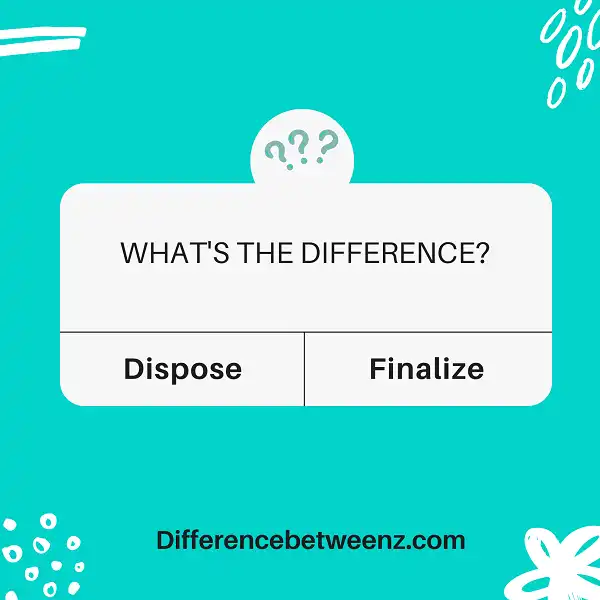If you have ever encountered the need to work with garbage collection and memory management in .Net, you may have come across the terms Dispose() and Finalize(). It can be quite confusing to determine when these methods should be used and which one should take precedence. Fortunately, this blog post will explain what each method does as well as when it is appropriate to use them so you can make sure your code is optimized for performance. Keep reading to find out what makes Dispose() and Finalize() different from each other!
What is Dispose?
- Dispose is a method used in computer programming to tell the code to clean up resources such as file handles, database connections, pointers, etc. Dispose can be called on an object when it is no longer needed or just before exiting the scope of a loop.
- Dispose of releases of any resources that are tied to this instance so other programs or objects can use them instead of having their requests blocked.
- Disposing of resources manually is especially important with IDisposable types like streams not calling Dispose will result in file locks remaining open until the program is closed. Dispose of – a valuable way to maintain the efficient use of storage and networking resources!
What is Finalize?
Finalize methods are an integral part of many computer engineering projects. Finalize methods are typically used to ensure proper clean-up of resources and memory upon completion of operations.
- Finalize is a predefined method in the Java language, which is automatically called when an object is no longer being used. Its purpose is to release any critical resources that the object might have acquired while running.
- Finalizing an object can save critical time and energy by freeing occupied memory rather than allowing it to sit idle until the process terminates or get garbage is collected.
- Finalize methods should be used judiciously and only when necessary as reliance on Finalizer threads may cause a deadlock or delay other processes while waiting for its timely invocation.
Difference Between Dispose and Finalize
Dispose and Finalize are two important methods for managing system resources in .NET applications.
- Dispose enables the manual disposal of objects and provides a convenient way to free up memory and other Operating System resources when they are no longer needed.
- Dispose can be used to free unmanaged resources such as database connections, network streams, locks, and files. On the other hand, Finalize is called automatically by the Garbage Collector when an object is no longer referenced in memory and can be used to manually clean up those same unmanaged resources.
- It is important to note that Dispose should always be called before Finalize in order to make sure all available system resources are released properly.
The Dispose pattern helps promote better resource management, increases the speed of applications, reduces errors arising from resource contention, and keeps system resources optimized for better performance.
Conclusion
While both Dispose() and Finalize() are important, it’s crucial to understand the difference between them. Remember that Dispose() should be called when you’re done with an object, while Finalize() is only necessary if you plan on creating a custom destructor for your class. By understanding these concepts, you’ll be able to create classes that are easier to work with and less likely to cause memory leaks.


